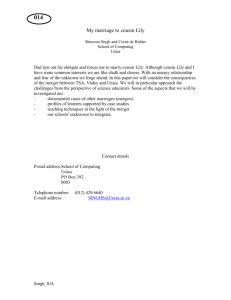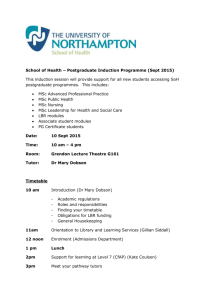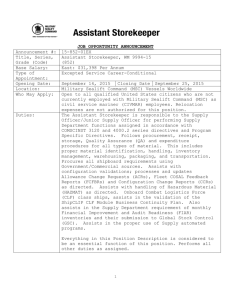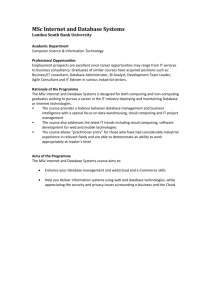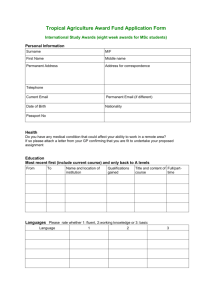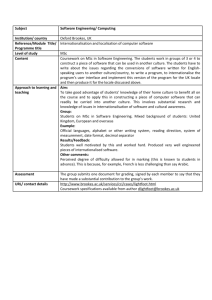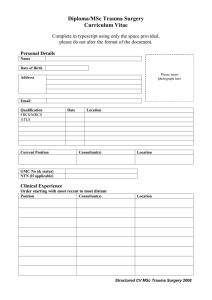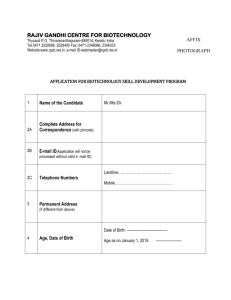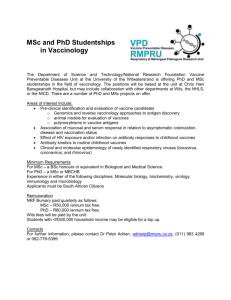Environmental Sciences
advertisement
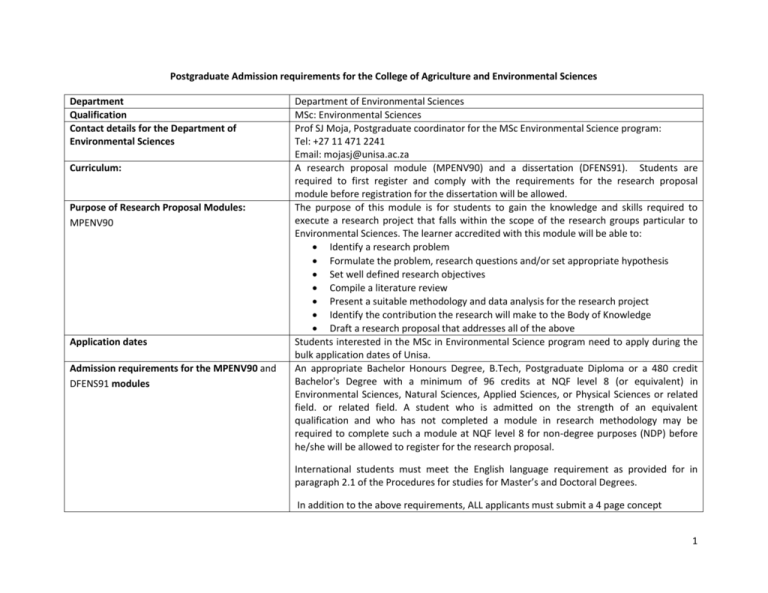
Postgraduate Admission requirements for the College of Agriculture and Environmental Sciences Department Qualification Contact details for the Department of Environmental Sciences Curriculum: Purpose of Research Proposal Modules: MPENV90 Application dates Admission requirements for the MPENV90 and DFENS91 modules Department of Environmental Sciences MSc: Environmental Sciences Prof SJ Moja, Postgraduate coordinator for the MSc Environmental Science program: Tel: +27 11 471 2241 Email: mojasj@unisa.ac.za A research proposal module (MPENV90) and a dissertation (DFENS91). Students are required to first register and comply with the requirements for the research proposal module before registration for the dissertation will be allowed. The purpose of this module is for students to gain the knowledge and skills required to execute a research project that falls within the scope of the research groups particular to Environmental Sciences. The learner accredited with this module will be able to: Identify a research problem Formulate the problem, research questions and/or set appropriate hypothesis Set well defined research objectives Compile a literature review Present a suitable methodology and data analysis for the research project Identify the contribution the research will make to the Body of Knowledge Draft a research proposal that addresses all of the above Students interested in the MSc in Environmental Science program need to apply during the bulk application dates of Unisa. An appropriate Bachelor Honours Degree, B.Tech, Postgraduate Diploma or a 480 credit Bachelor's Degree with a minimum of 96 credits at NQF level 8 (or equivalent) in Environmental Sciences, Natural Sciences, Applied Sciences, or Physical Sciences or related field. or related field. A student who is admitted on the strength of an equivalent qualification and who has not completed a module in research methodology may be required to complete such a module at NQF level 8 for non-degree purposes (NDP) before he/she will be allowed to register for the research proposal. International students must meet the English language requirement as provided for in paragraph 2.1 of the Procedures for studies for Master’s and Doctoral Degrees. In addition to the above requirements, ALL applicants must submit a 4 page concept 1 Selection criteria Selection procedure document (PDF) describing their intended research. Students will be accepted on the following criteria: 1. Suitability and viability of the intended research as presented by the student 2. English writing skills as reflected in the submitted documentation 3. The supervision capacity within the specific research group 4. The full academic record will be evaluated and ranked (aspects that will be taken into account with the ranking is the number of supplementary opportunities a candidate has used to obtain the graduate degree; the percentages obtained for other modules in the graduate degree; the number of times a student repeated a module; the length of time the student took to complete the graduate degree. 5. Should it be determined that more students from a specific group are registering for the qualification, the correction of this bias will be included in the ranking criteria for admission. 6. All students from outside the borders of South Africa will only be considered if their application is accompanied by the name and curriculum vitae of a possible supervisor located in the country in which the research is to be undertaken. 7. Due to the gender bias of the present cohort of students, preference will be given to female applicants during the selection process. 8. Due to the racial bias of the present cohort of students, preference will be given to South African Indian, Coloured and Black applicants, followed by South African White applicants and lastly foreign nationals during the selection process. Apply online for a student number and appropriate qualification Application should reach the student admission office no later than 15 November The application will be forwarded to the Department of Environmental Sciences for consideration A selection committee will complete the review process of the application by 31 January 2015 In cases where clarity is required on the application the research field/theme leader may consider requesting an interview (telephonic or in person) with the candidate Applications of selected candidates will be submitted to the College Research Innovation and Higher Degrees committee for final approval 2 Procedures for unsuccessful applications Documents to support application Successful candidates will be notified by 15 February or as soon as possible thereafter. Successful applicants must formally register by 15 March. Candidates who were not successful may apply to the COD of the Department for the reasons for rejection of the application. A further appeal may be submitted through the appropriate Unisa procedures A Candidate will be requested to provide the following documentation: An updated CV A five page research concept document within the scope of the research group Assessment mode for MPENV90 The research concept document will be assessed through the use of an assessment rubric Assessment criteria for Research proposal The assessment is based on the vetting of each research concept document within the Department of Environmental Sciences. The vetting committee consist of two appropriate internal departmental experts of which one should at least be familiar with the field of research. The concept document is then discussed at a Departmental Vetting committee meeting which consists of staff members who are conform to the following criteria: senior staff members and/or may have NRF rating and/or are supervisors or co-supervisors of students and/or have examined concept document before and/or have been requested to do act as an external examiner for other universities. Assessment criteria for Concept Document for MSc in Environmental Sciences Research proposal evaluation grid Mode of delivery of MPENV90 Online delivery will be followed through means of study units on myUnisa, discussion forums and the submission of two assignments on myUnisa related to the research proposal. Contact sessions may be organised by the post graduate programme coordinator for all masters students in the Department of Environmental Sciences A seminar may also be organised for the presentation of completed research 3 Mode of supervision for MPENV90 External supervision New intake for 2015 Motivation for intake Name of the Research Group proposals which may be delivered through video conferencing or on the Florida campus Supervision may be delivered in different modes depending on the requirement of the supervisor and study design. One-on-one contact sessions may be required which can be delivered through video conferencing for students in remote areas or through personal visits to the supervisor Should the need arise to include an external supervisor the decision will be made based on the expertise or assistance required from an external supervisor on a particular part of the project. This will only be implemented if the internal capacity of supervision cannot support the requirement of the research project. Enrolment plan 2015 Seven (7) new students can be accommodated in the MSc Environmental Sciences program for 2015. The number of students will be accommodated in the research themes indicated in the columns below. The Department is not obliged to accept all applicants that apply. Applicants will be approved on the basis of the submitted research concept document. The Masters in Environmental Sciences programme will continue a selected intake in each year. Currently there are two Environmental Management lecturers with Doctoral degrees who will continue with the bulk of M&D supervision. Research Group Environmental Pollution, Ecotoxicology and Remediation Studies (EPERS) Team leaders of Research Group Team members of Research Group Prof M Tekere and Prof SJ Moja Team members Prof M Tekere Prof SJ Moja Mr N Baloyi Mr KW Maphangwa Ms M Matlala Ms ME Brand Goal and Purpose of the Research Group The focus of this research group includes but is not limited to quality, risk and impact assessments, monitoring, analyses and management of environmental pollutants in the environment, ecotoxicology, modelling and environmental remediation (bio- and phyto-) studies; optimization and application of analytical chemistry and Specialization of Team member Environmental Biotechnology Environmental Analytical Chemistry Environmental Chemistry Environmental Science Aquatic Science Aquatic Science 4 biotechnological techniques in environmental and industrial research areas. Key focuses of the Research Group The group is interested in finding innovative and sustainable solutions to the declining quality of the air, water and soil due to anthropogenic activities. Treatment and management of solid and effluent waste are also handled by this group. Members will look at innovative and cost effective environmental sample collection methods, extraction methods; extract purification methods; synthesis of novel adsorbent material and their application in different environmental and industrial scenarios; analytical method developments; eco-toxicological studies; pollution control, treatment and management activities, etc. Research Themes in the Research Group MSc or PhD level capacity 1 Project name: Environmental Analytical Chemistry MSc Capacity for each research project 2 2 Project name: Environmental biotechnology MSc 2 3. Project name: Aquatic science and environmental monitoring 4. Project name: Environmental Chemistry MSc 1 MSc 1 5. Project name: Aquatic Science MSc 1 Possible supervisor Prof SJ Moja 011 471 378 mojasj@unisa.ac.za Prof M Tekere 011 471 2270 tekerm@unisa.ac.za Mr KW Maphangwa maphakw@unisa.ac.za Mr N Baloyi baloynd@unisa.ac.za Ms Matlala matlamd1@unisa.ac.za 5

